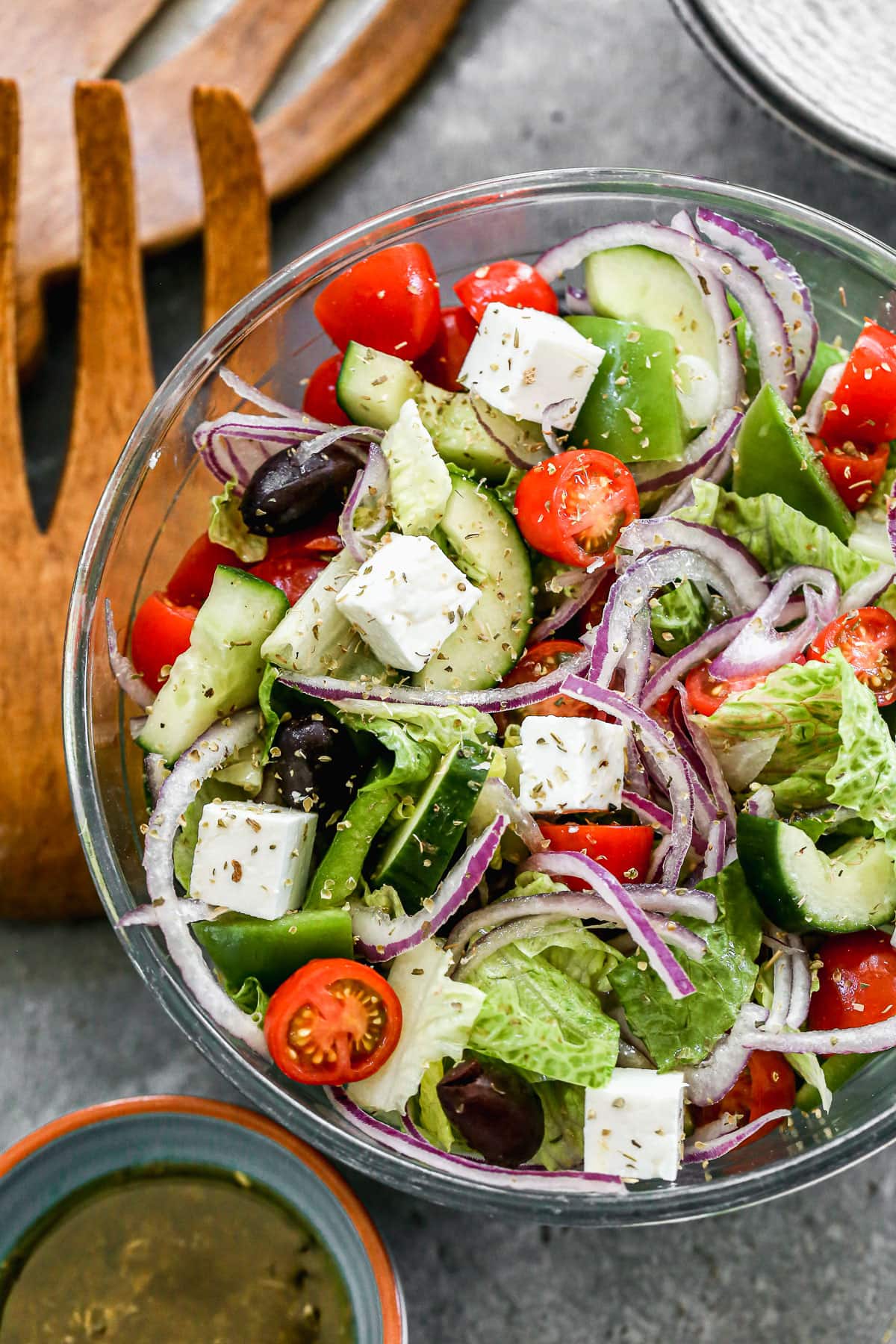Ultimate Guide to Healthy Greek Salad Dressing for Parents
Hey there, health-savvy parents! Are you on the lookout for a simple, tasty, and nutritious way to jazz up your family’s greens? Look no further because we’re about to dive into the wonderful world of Greek salad dressing – a perfect blend of flavor and goodness for any salad-loving family!
Salads are a cornerstone of healthy eating, and what better way to enhance their nutritional punch than with a homemade Greek salad dressing! Read on to master the art of creating this Mediterranean magic right in your kitchen.
Groovy Greek Dressing 101
We all know that a salad is only as good as its dressing, and a Greek salad dressing is no exception. Bursting with the classic flavors of olive oil, lemon juice, garlic, and herbs, this dressing is a winner for not only taste buds but also for overall health.
Benefits of a Homemade Greek Dressing
- Control what goes in: When you make your dressing, you dictate the quality of the ingredients, which means you can opt for organic, non-GMO, and fresh products.
- Reduce preservatives and additives: Many store-bought dressings are laden with extras that you might prefer to avoid. A homemade version keeps it clean!
- Adjust flavors: Some like it tangy, some like it herby—making your dressing lets you tweak the recipe to your family’s taste preference.
- Support healthy eating habits: Introduce your kids to the art of cooking with all-natural ingredients and watch them develop healthier food preferences.
The Secret to a Superb Greek Salad Dressing
A classic Greek dressing is all about the harmony of its core ingredients. Let’s take a look at what you’ll need:
Essential Ingredients:
- Extra-virgin olive oil: The heart-healthy foundation of any true Greek dressing.
- Lemon juice: Adds the zest and tang that’s so characteristic of Mediterranean fare.
- Garlic: One or two cloves, minced or pressed, will do the trick.
- Dried oregano and basil: These herbs infuse your dressing with the authentic Greek flavors.
- Red wine vinegar: For that touch of acidity that balances out the flavors.
- Dijon mustard: A small amount helps emulsify the dressing for the perfect texture.
- Feta cheese: A Greek salad dressing can be enhanced with a bit of crumbled feta for extra tanginess.
- Sea salt and freshly cracked black pepper: To taste!
Once you’ve got your ingredients lined up, it’s all about whisking them together into a delightful concoction that’ll turn those leafy bites into a Mediterranean feast. And here’s a pro tip for you – let your kids join in! Measuring the olive oil, squeezing the lemon, and tossing the salad are great ways for them to get hands-on cooking experience.
We’re just getting started on making the perfect Greek salad dressing that will become a family favorite. Stay tuned for the step-by-step walkthrough, variations for all taste preferences, and some savvy tips on how to involve your kids in the process!
Spoiler alert: Your salads at home are about to get a big, fat, Greek upgrade, and everyone, from picky toddlers to skeptical teens, will be clamoring for their veggies. Yes, you heard that right – veggies have never been this exciting!

5 Things Parents Should Know When Preparing Greek Salad Dressing
1. Quality of Ingredients Matters
When it comes to a splendid Greek salad dressing, the quality of your ingredients can make all the difference. Opt for extra-virgin olive oil for its superior taste and health benefits. When choosing lemons, fresh is best for that zingy citrus burst. And don’t skimp on the herbs – even though they’re dried, ensure they’re not past their prime for optimal flavor.
2. Health Benefits Abound
Did you know that Greek salad dressing can be a little treasure trove of health benefits? Olive oil is renowned for its heart-friendly monounsaturated fats. Garlic has anti-inflammatory properties, and the herbs offer a range of antioxidants. So, not only is your homemade dressing scrumptious, but it’s also helping your family stay healthy.
3. Embrace the Freshness
While dried herbs are a staple in Greek dressing, don’t hesitate to use fresh herbs like dill, mint, or parsley if you have them on hand. They’ll add a lovely freshness and are a great way to introduce a variety of flavors to your little ones. Plus, it’s a fantastic way to use up any herbs you may have growing in your garden or sitting in your fridge.
4. Customization Is Key
One of the joys of making your own salad dressing is that you can customize it to suit your family’s taste buds. Want it less tart? Reduce the vinegar. Kids not too fond of garlic? Dial it back. Craving a creamier texture? Add a bit more Dijon mustard or even a spoonful of Greek yogurt! The possibilities are endless and entirely in your hands.
5. Involve Your Kids
Creating Greek salad dressing is a perfect opportunity to involve your kids in meal prep. Measuring ingredients helps them learn about quantities and volume, while whisking the mixture can improve motor skills. Plus, they’re more likely to eat (and enjoy!) foods they’ve had a hand in making. It’s an educational experience that ends with a tasty reward.
Step-by-Step: Crafting Your Homemade Greek Salad Dressing
Get ready to whisk up some culinary delight! Here’s a simple step-by-step guide to creating your very own Greek salad dressing:
- In a small bowl or jar, combine half a cup of extra-virgin olive oil, the juice of one lemon, two tablespoons of red wine vinegar, one teaspoon of Dijon mustard, and if you’re including it, a tablespoon of crumbled feta cheese.
- Add one to two minced garlic cloves, one teaspoon of dried oregano, and half a teaspoon of dried basil. If using fresh herbs, finely chop and add according to your taste preference.
- Season your concoction with sea salt and freshly cracked black pepper. Remember, it’s easier to add more seasoning than to take it away, so start with a pinch and adjust as needed.
- Whisk all the ingredients together until well combined. If you’re using a jar, secure the lid and give it a good shake, making this task kid-friendly and fun!
- Taste and adjust. If it’s too tangy, add a bit more olive oil. Too bitter? A small dash of honey or agave can bring balance.
- Let the dressing sit for a bit before serving. This allows the flavors to meld together beautifully. You can make it ahead of time and store it in the fridge, where it will keep for up to a week.
Drizzle your freshly made dressing over a classic Greek salad, or any salad of your choosing, and watch as it transforms humble veggies into a dish that’s bursting with Mediterranean flair.
Explore different variations and find your family’s favorite — perhaps a little more lemon for a citrusy punch or a sprinkle of sumac for a Middle Eastern twist. The beauty of making your own dressing is in the discovery of flavors that best suit your family’s palate.
But let’s not stop there! Greek salad dressing isn’t just for salads. It’s versatile enough to be used as a marinade for grilled chicken, a zesty dip for veggies, or even as a flavorful drizzle over roasted potatoes. The joy of exploring the multifaceted uses of your homemade dressing adds an exciting dimension to everyday cooking.
Remember, dear parents, that introducing your kids to a variety of tastes and ingredients not only expands their culinary horizons but also creates joyous memories in the kitchen. So, gather the troops, grab your whisk, and let’s make some Greek salad dressing greatness together!
For more great articles please see here. For more information see here
Disclaimer
The articles available via our website provide general information only and we strongly urge readers to exercise caution and conduct their own thorough research and fact-checking. The information presented should not be taken as absolute truth, and, to the maximum extent permitted by law, we will not be held liable for any inaccuracies or errors in the content. It is essential for individuals to independently verify and validate the information before making any decisions or taking any actions based on the articles.




